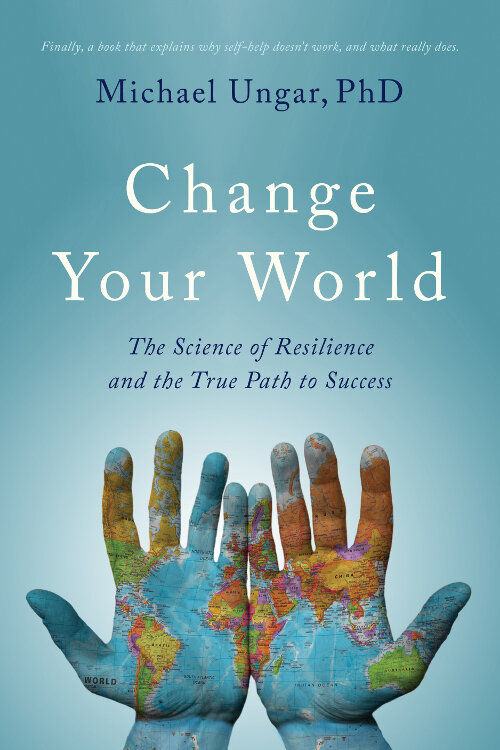I’m back with another book pairing. (Yes, I know: that was quick! It’s because I have a huge backlog of books I’ve been meaning to blog about — and launching this new blog feature has inspired me to catch up on that backlog.)
Anyway, the second book I want to tell you about is Michael Ungar’s latest book: Change Your World: The Science of Resilience and the True Path to Success — a book that takes a deep dive into the science of resilience to identify the factors that actually allow people to thrive. (Spoiler alert: It’s not about hustling a little harder or being more motivated: it’s about being fortunate enough to grow up in an environment that is rich in opportunity.)
What I love about this book is that Ungar rejects the idea that success is something that is completely within our control as individuals and highlights instead the importance of broader, more systemic factors: what’s happening in our families, our community, and our world. Improving our personal circumstances becomes less about changing ourselves and more about joining forces with other people to make things better for all of us, in other words. As Ungar explains: “We need a clean break from the mindset that places the responsibility for self-actualization on an individual’s shoulders—it is a misread of what the science tells us about what makes us successful. If we want to understand why some people succeed and others do not, and if we want to succeed ourselves, we will need far fewer motivational gurus and much more help from the people in our families, our workplaces, our communities, and our society.”
Bottom line? It’s less about do-it-yourself and more about do-it-with-others.
I recently had the opportunity to interview Michael Ungar about his book. We talked about the importance of tapping into support from the village (a key theme in my most recent book, Happy Parents, Happy Kids) and helping our children to do the same. What follows are a series of questions (mine) and answers (his).
Q: Why are North Americans so drawn to self-help solutions? Why is it so hard for us to accept and embrace (a) our interconnectedness to other humans and (b) the impact of broader environments on our lives?
A: There is an overwhelming myth of the rugged individual that infiltrates every part of our social world. It seems to blind us to the real sources of our resilience: our relationships, our communities, our institutions. While I understand the need to be self-directed and motivated, the science of resilience tells us that striving in a world that offers us few opportunities to use our talents or succeed simply creates frustration and burnout (allostatic load). Our success depends on the world around us changing to meet our needs, or at least making opportunities available for us to use.
Q: Why is it important for children/youth to grow up understanding that they are part of something much bigger than themselves — a family, a community, humanity?
A: A child who understands that she is part of a larger system is a child who will have more of the building blocks for resilience. These include a sense of accountability to others, a sense of belonging, and a sense of one’s cultural heritage. So much of who we are, and our sense of wellbeing, hinges on our immersion in networks of relationships. Even in school, the quality of our relationship with our teacher can profoundly influence academic outcomes, especially for more vulnerable/challenged students.
Q: What is your best advice to parents in terms of how to foster this awareness?
A: First, model being part of a community, an extended family, a workplace. Then don’t be shy about insisting children become part of these relationships too. Expect them to eat with adults. Expect them to travel with you to places you are interested in. When our children see us navigating our way through the world, and finding ways to feel valued, they learn how to do the same. I just don’t understand why we let children become isolated, or insist that every activity is centred on their needs. This does nothing but create narcissism, when what we want is our children to feel a part of networks of people who rely upon them.
Ann Douglas is the author of numerous books about pregnancy and parenting including, most recently, Happy Parents, Happy Kids. She is also the weekend parenting columnist for CBC Radio.
